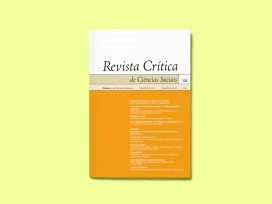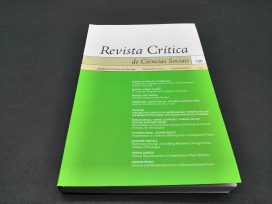Collective suicide or globalization from below?
Boaventura de Sousa Santos argues that the war in Iraq finds its roots in the climate of prevailing neoliberal globalisation and the supposition of total power and violent domination on behalf of the West. The outcome of this genocidal war is as yet uncertain but what is needed immediately is a strategic shift from all global actors – especially the NGOs – to stand up for peace.
According to the German philosopher Franz Hinkelammert, living in Costa Rica, the West has repeatedly been under the illusion that it should try to save humanity by destroying part of it. This is a salvific and sacrificial destruction, committed in the name of the need to fulfill radically all the possibilities opened up by a given social and political reality over which it is supposed to have total power. This is how it was in colonialism, with the genocide of indigenous peoples, and the African slaves. This is how it was in the period of imperialist struggles, which caused millions of deaths in two world wars and many other colonial wars. This is how it was in Stalinism, with the Gulag and in Nazism, with the holocaust. And now today, this is how it is in neoliberalism, with the collective sacrifice of the periphery of the world system. With the war against Iraq, it is fitting to ask whether what is in progress is a new genocidal and sacrificial illusion, and what its scope might be. It is above all appropriate to ask if the new illusion will not herald the radicalization and the ultimate perversion of the western illusion: destroying all of humanity in the illusion of saving it.
Sacrificial genocide arises from a totalitarian illusion that is manifested in the belief that there are no alternatives to the present-day reality and that the problems and difficulties confronting it arise from failing to take its logic of development to its ultimate consequences. If there is unemployment, hunger and death in the Third World, this is not the result of market failures; instead, it is the outcome of the market laws not having been fully applied. If there is terrorism, this is not due to the violence of the conditions that generate it; it is due, rather, to the fact that total violence has not been employed to physically eradicate all terrorists and potential terrorists.
This political logic is based on the supposition of total power and knowledge, and on the radical rejection of alternatives; it is ultra-conservative in that it aims to infinitely reproduce the status quo. Inherent to it is the notion of the end of history. During the last hundred years, the West has experienced three versions of this logic, and, therefore, seen three versions of the end of history: Stalinism, with its logic of insuperable efficiency of the plan; Nazism, with its logic of racial superiority; and neoliberalism, with its logic of insuperable efficiency of the market. The first two periods involved the destruction of democracy. The last one trivializes democracy, disarming it in the face of social actors sufficiently powerful to be able to privatize the State and international institutions in their favour. I have described this situation as a combination of political democracy and social fascism. One current manifestation of this combination resides in the fact that intensely strong public opinion, worldwide, against the war is found to be incapable of halting the war machine set in motion by supposedly democratic rulers.
At all these moments, a death drive, a catastrophic heroism, predominates, the idea of a looming collective suicide, only preventable by the massive destruction of the other. Paradoxically, the broader the definition of the other and the efficacy of its destruction, the more likely collective suicide becomes. In its sacrificial genocide version, neoliberalism is a mixture of market radicalization, neoconservatism and Christian fundamentalism. Its death drive takes a number of forms, from the idea of “discardable populations”, referring to citizens of the Third World not capable of being exploited as workers and consumers, to the concept of “collateral damage”, to refer to the deaths, as a result of war, of thousands of innocent civilians. The last, catastrophic heroism, is quite clear on two facts: according to reliable calculations by the Non-Governmental Organization MEDACT, in London, between 48 and 260 thousand civilians will die during the war against Iraq and in the three months after (this is without there being civil war or a nuclear attack); the war will cost 100 billion dollars, – and much more if the costs of reconstruction are added – enough to pay the health costs of the world’s poorest countries for four years.
Is it possible to fight this death drive? We must bear in mind that, historically, sacrificial destruction has always been linked to the economic pillage of natural resources and the labor force, to the imperial design of radically changing the terms of economic, social, political and cultural exchanges in the face of falling efficiency rates postulated by the maximalist logic of the totalitarian illusion in operation. It is as though hegemonic powers, both when they are on the rise and when they are in decline, repeatedly go through times of primitive accumulation, legitimizing the most shameful violence in the name of futures where, by definition, there is no room for what must be destroyed. In today’s version, the period of primitive accumulation consists of combining neoliberal economic globalization with the globalization of war. The machine of democracy and liberty turns into a machine of horror and destruction.
In opposition to this, there is the ongoing movement of globalization from below, the global struggle for social justice, led by social movements and NGOs, of which the World Social Forum (WSF) has been an eloquent manifestation. The WSF has been a remarkable affirmation of life, in its widest and most inclusive sense, embracing human beings and nature. What challenges does it face before the increasingly intimate interpenetration of the globalization of the economy and that of war?
I am convinced that this new situation forces the globalization from below to re-think itself, and to reshape its priorities. It is well-known that the WSF, at its second meeting, in 2002, identified the relationship between economic neoliberalism and imperial warmongering, which is why it organized the World Peace Forum, the second edition of which took place in 2003. But this is not enough. I believe that a strategic shift is required. Social movements, no matter what their spheres of struggle, must give priority to the fight for peace, as a necessary condition for the success of all the other struggles. This means that they must be in the frontline of the fight for peace, and not simply leave this space to be occupied solely by peace movements. All the movements against neoliberal globalization are, from now on, peace movements. We are now in the midst of the fourth world war (the third being the Cold War) and the spiral of war will go on and on. The principle of non-violence that is contained in the WSF Charter of Principles must no longer be a demand made on the movements; now it must be a global demand made by the movements. This emphasis is necessary so that, in current circumstances, the celebration of life can be set against this vertiginous collective suicide. The peace to be fought for is not a mere absence of war or of terrorism. It is rather a peace based upon the elimination of the conditions that foster war and terrorism: global unjustice, social exclusion, cultural and political discrimination and oppression and imperialist greed.
A new, cosmopolitan humanism can be built above and beyond western illuminist abstractions, a humanism of real people based on the concrete resistance to the actual human suffering imposed by the real axis of evil: neoliberalism plus war.
Published 26 March 2003
Original in Portuguese
Translated by
Jean Burrows
First published by Visão (Portugal) and Folha
de São Paulo (Brasil) 19 March 2003.
Contributed by Revista Crítica de Ciências Sociais © Boaventura de Sousa Santos Eurozine
PDF/PRINTNewsletter
Subscribe to know what’s worth thinking about.



